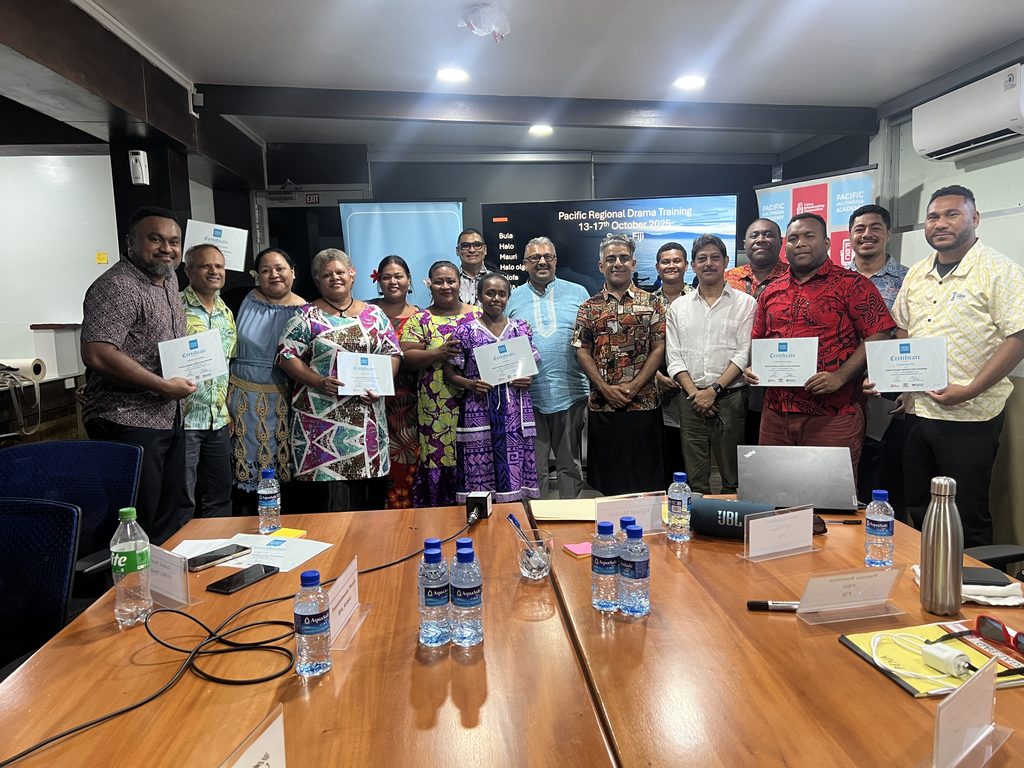Last month in Suva, the airwaves came alive with creativity as BBC Media Action shared its global expertise in radio production through The Art and Science of Radio Drama training.
Drawing on decades of experience in media development, BBC Media Action designed a comprehensive curriculum, provided expert trainers and materials, and led an immersive training program in partnership with the Fiji Broadcasting Corporation’s (FBC) Pacific Multi-Media Academy. Together, they equipped 14 broadcasters from across the Pacific with the tools to create powerful, culturally resonant radio dramas.
More than just entertainment, radio drama is a bridge between stories and society—a medium that preserves culture, sparks dialogue, and stirs the imagination. Throughout the training, participants learned how to craft compelling narratives, develop relatable and aspirational characters, build tension through conflict, and use sound to paint vivid mental pictures.
BBC Media Action’s Pacific Project Director, Dipak Bhattarai, who facilitated the sessions, emphasized the importance of maintaining both creative and technical excellence.
“We ensured that production standards were high and that the stories reflected the realities and broadcast needs of local communities,” Mr Bhattarai said. “FBC provided the essential studio facilities, technical equipment, and engaged staff—making sure the training stayed grounded in the real-world environment of Pacific broadcasting.”
With this collaboration, BBC Media Action and FBC have helped nurture a new wave of storytellers—broadcasters ready to use the power of sound to inspire, inform, and connect audiences across the Pacific.
Strengthening media capacity in the Pacific
The British High Commission in Suva, through UK International Development, has reaffirmed its commitment to strengthening media capacity and public service broadcasting in Fiji and across the Pacific by funding a specialized radio drama training.
The initiative, delivered by BBC Media Action, builds on a series of past trainings designed to empower Pacific journalists with modern media skills and creative storytelling tools.
“In the beginning of the year, BBC Media Action in partnership with the Fijian Media Association (FMA), organised the Best Use of Social Media training for Fijian journalists and the wider Pacific journalists for two weeks,” Mr Bhattarai said.
“Similarly, there was a Covering Truth and Reconciliation Process workshop organised for Fijian journalists in partnership with FMA, and there are more media strengthening activities organised by BBC Media Action in Fiji and across the Pacific.”
Over the five-day Art and Science of Radio Drama training, participants explored the fundamentals of radio storytelling — from scriptwriting and character development to sound design and production.
“I was thoroughly impressed with the participants’ engagement and talent. The learning curve for many was steep, but they tackled the technical and creative challenges with enthusiasm,” said one of the facilitators.
“Watching them apply new scriptwriting techniques, develop characters, and grasp the nuances of sound design in their final production was genuinely rewarding. Their final dramas were of a high standard, demonstrating a clear and solid grasp of drama production principles.”
A partnership rooted in shared values
During the opening ceremony, British High Commission Counsellor Josh Kemp expressed his appreciation for the return of BBC Media Action to the Pacific and for the chance to collaborate with dedicated journalists from across the region.
“BBC is one of those institutions that, when we go around the Pacific, people talk to us warmly about their experience with it, quite often through the BBC World Service, which is still broadcasting across the Pacific,” Mr Kemp said.
“We are also proud of the work that BBC Media Action does because they take the principles, the skills that BBC has and come and find people who are as committed, if not more committed, than they are to finding the truth.”
Mr Kemp noted that the project’s reach in the Pacific has grown steadily since its inception, emphasizing the essential role of the participating journalists.
“You are informing citizens not just to keep them entertained but to also educate them,” he said.
“Those three principles — inform, educate and entertain — on which the BBC was founded remain as true to your work today, across the region, as they do for my colleagues back in London and all over the world.
“On behalf of the UK Government, I thank you so much for everything you do. Upholding media freedom is a challenge all over the world right now.”
Learning new skills and inspiring creativity
Among the participants was Joana Boulekone, a producer and presenter from Vanuatu Broadcasting and Television Corporation’s Radio Vanuatu. She described the workshop as a transformative experience for young professionals entering the industry.
“I really enjoyed every session, learning about how each element plays a role in bringing the story to life,” Ms Boulekone said.
“One of the new skills that I’ve gained from the training is script writing. At our station we have a script writer and sound engineer who does all the work — we get to do voicing only. After the training I’ve learned to do scripting, sound, and how to work with actors to bring the right emotion to the story, basically guiding them.”
She added that the training has reshaped her understanding of the medium’s creative potential.
“The training has opened my mind to see how powerful radio can be in drama production,” she said.



